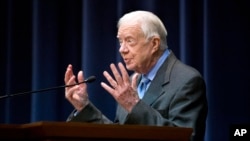Former U.S. president Jimmy Carter says a Syrian peace conference set for January is "unlikely to succeed" because preconditions set by the Syrian government and opposition have created a stalemate.
In an opinion article published in The Washington Post, Carter and American University professor Robert Pastor argue that an election observed by the international community and protected by international peacekeepers is the best way to end the Syrian conflict.
They argue that the negotiations in Geneva should be based on a vote that must be accepted if judged to be free and fair, and that those who win must guarantee to respect "all sectarian and minority groups."
Opposition members have demanded Syrian President Bashar al-Assad step down as part of a peace plan, while the government has called on rebels to halt their fighting.
The U.N. will host the talks beginning January 22, with a goal of negotiating a transitional government to lead Syria out of the crisis that has killed more than 100,000 people and displaced millions more.
Carter and Pastor say all sides in Syria will need to make hard compromises and retreat from their "former unreasonable demands." They say the "unwinnable war" has continued because those fighting believe that losing means facing "annihilation."
They also praised the work of U.N. peace envoys Kofi Annan and Lakhdar Brahimi, but noted that the diplomats have not been able to use their negotiating ability because the Syrian sides have not focused on ways to mutually settle their differences.
Carter was awarded the Nobel Peace Prize in 2002 for his work to resolve international conflicts.
In an opinion article published in The Washington Post, Carter and American University professor Robert Pastor argue that an election observed by the international community and protected by international peacekeepers is the best way to end the Syrian conflict.
They argue that the negotiations in Geneva should be based on a vote that must be accepted if judged to be free and fair, and that those who win must guarantee to respect "all sectarian and minority groups."
Opposition members have demanded Syrian President Bashar al-Assad step down as part of a peace plan, while the government has called on rebels to halt their fighting.
The U.N. will host the talks beginning January 22, with a goal of negotiating a transitional government to lead Syria out of the crisis that has killed more than 100,000 people and displaced millions more.
Carter and Pastor say all sides in Syria will need to make hard compromises and retreat from their "former unreasonable demands." They say the "unwinnable war" has continued because those fighting believe that losing means facing "annihilation."
They also praised the work of U.N. peace envoys Kofi Annan and Lakhdar Brahimi, but noted that the diplomats have not been able to use their negotiating ability because the Syrian sides have not focused on ways to mutually settle their differences.
Carter was awarded the Nobel Peace Prize in 2002 for his work to resolve international conflicts.





